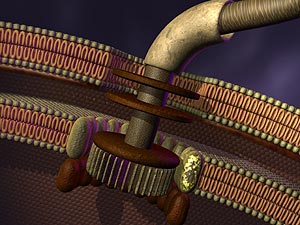|
Irreducible
Complexity:
In his landmark book, "Darwin's
Black Box", Michael Behe introduced the notion of irreducible complexity
as a challenge to neo-Darwinian theory:
"By irreducibly complex I mean a single system composed of several
well-matched, interacting parts that contribute to the basic function,
wherein the removal of any one of the parts causes the system to effectively
cease functioning. " [page 39]
Why is irreducible complexity a challenge to Darwinian theory?
In the "Origins of Species" Charles Darwin wrote:
"If it could be demonstrated that any complex organ existed which could
not possibly have been formed by numerous, successive, slight modifications,
my theory would absolutely break down." [Sixth Edition, New York University
Press, page 154]
Irreducible complexity is a challenge to Darwinian theory because it
shows that some biological structures cannot be built by "numerous,
successive, slight modifications" as Darwin first proposed.

A prime example of Michael Behe's "irreducible complexity"
is the bacteria flagellum. With over 40 essential parts, the
flagellum is a rotary motor used to propel a bacteria in liquid.
Spinning at 17,000 rpms, the motor is acid driven, liquid cooled
and self-replicating.
--- Flagellum image created by Discovery Media Productions
|



